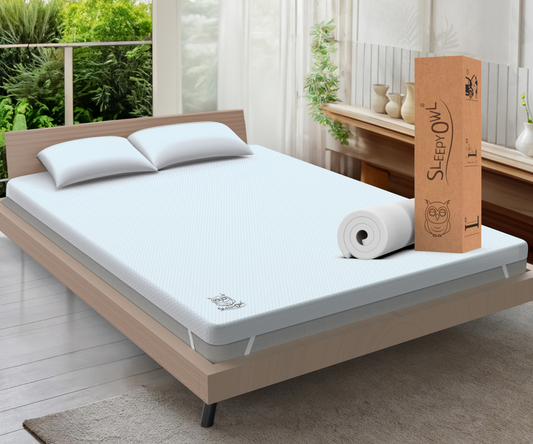Summer Clean: Why you should tidy your room for better sleepy
A tidy room plays a crucial role in fostering an environment conducive to restful sleep. When the space around us is organized and clutter-free, it can significantly influence our mental state, leading to improved sleep quality. A clean room minimizes distractions and creates a serene atmosphere that encourages relaxation.
Studies have shown that individuals who sleep in tidy environments often report falling asleep faster and experiencing deeper sleep cycles. This is largely due to the absence of visual clutter, which can trigger anxiety and restlessness, making it difficult to unwind at the end of the day. Moreover, a well-maintained bedroom can enhance the overall sleep experience by promoting a sense of control and order.
When everything is in its designated place, it reduces the cognitive load on our minds, allowing us to focus on winding down rather than being preoccupied with the chaos around us. The psychological impact of a tidy room cannot be overstated; it serves as a sanctuary where one can escape the stresses of daily life. By prioritizing cleanliness and organization, individuals can create a personal retreat that not only supports better sleep but also contributes to overall well-being. Check out this amazing Memory Foam Mattress Topper for a better night's sleep.
Decluttering for a Peaceful Mind
Decluttering is more than just a physical act; it is a mental exercise that can lead to significant emotional benefits. The process of removing unnecessary items from our living spaces can be liberating, allowing us to let go of the past and make room for new experiences. When we declutter, we often find that we are not just clearing out physical space but also creating mental clarity.
This newfound clarity can lead to reduced stress levels and an enhanced ability to focus on what truly matters in our lives. In practical terms, decluttering can be approached in various ways, such as the KonMari method or the 30-day decluttering challenge. These methods encourage individuals to evaluate their belongings critically, keeping only those items that spark joy or serve a functional purpose.
As one engages in this process, it becomes evident how much emotional weight is tied to physical possessions. By letting go of items that no longer serve a purpose, individuals can cultivate a more peaceful mindset, which is essential for achieving restful sleep. The act of decluttering not only transforms the physical space but also fosters a sense of accomplishment and empowerment.
The Role of a Memory Foam Mattress Topper in Quality Sleep
A memory foam mattress topper can significantly enhance the quality of sleep by providing additional support and comfort. These toppers are designed to conform to the body’s shape, distributing weight evenly and alleviating pressure points. This feature is particularly beneficial for individuals who suffer from chronic pain or discomfort while sleeping.
By adding a layer of memory foam to an existing mattress, sleepers can experience improved spinal alignment and reduced tossing and turning throughout the night. Furthermore, memory foam has unique properties that contribute to a more restful sleep environment. It is known for its ability to absorb motion, making it an excellent choice for couples who may disturb each other during the night.
The material’s density helps minimize disturbances caused by movement, allowing both partners to enjoy uninterrupted sleep. Additionally, many memory foam toppers are designed with temperature regulation features, ensuring that sleepers remain cool throughout the night. This combination of support, motion isolation, and temperature control makes memory foam toppers an invaluable investment for anyone seeking to enhance their sleep quality.
Creating a Relaxing Environment with Cleanliness
Creating a relaxing environment is essential for promoting restful sleep, and cleanliness plays a pivotal role in this process. A clean room not only looks inviting but also contributes to a sense of calm and tranquility. The act of cleaning itself can be therapeutic; engaging in routine cleaning tasks can serve as a form of mindfulness practice, allowing individuals to focus on the present moment while creating an inviting space for relaxation.
In addition to visual appeal, cleanliness impacts other sensory elements that contribute to a peaceful atmosphere. Fresh linens, dust-free surfaces, and organized spaces can evoke feelings of comfort and safety. Incorporating elements such as soft lighting, calming scents from essential oils or candles, and soothing colors can further enhance the relaxing environment.
By prioritizing cleanliness and creating an aesthetically pleasing space, individuals can cultivate an atmosphere that encourages relaxation and prepares the mind and body for restorative sleep.
The Connection Between Tidiness and Mental Health
The connection between tidiness and mental health is well-documented in psychological research. A cluttered environment can lead to feelings of overwhelm and anxiety, while an organized space promotes feelings of control and stability. When individuals are surrounded by chaos, it can be challenging to focus on tasks or engage in self-care practices; this often leads to increased stress levels and diminished mental well-being.
Conversely, maintaining a tidy space can have profound effects on mental health. It fosters a sense of accomplishment and boosts self-esteem as individuals take charge of their environments. Moreover, tidiness can enhance productivity by reducing distractions and creating an atmosphere conducive to concentration.
This positive feedback loop reinforces the importance of maintaining an organized space as part of a holistic approach to mental health care. By recognizing the impact of tidiness on emotional well-being, individuals can take proactive steps toward creating environments that support their mental health needs.
Organizing for Improved Productivity
Streamlining Daily Routines
Effective organization strategies can include categorizing items by function or frequency of use, utilizing storage solutions such as bins or shelves, and implementing systems that promote easy access to essential items. For instance, keeping frequently used items within arm's reach while storing less frequently used items out of sight can streamline daily routines.
Minimizing Distractions and Maintaining Focus
Additionally, creating designated areas for specific activities—such as workspaces for studying or creative endeavors—can help individuals maintain focus and minimize distractions.
Enhancing Overall Quality of Life
By investing time in organizing their spaces, individuals can create environments that not only support productivity but also enhance overall quality of life.
The Benefits of a Clean Room for Allergies and Respiratory Health
A clean room offers significant benefits for individuals suffering from allergies or respiratory issues. Dust mites, pet dander, mold spores, and other allergens thrive in cluttered environments where they can accumulate over time. Regular cleaning practices—such as vacuuming carpets, washing bedding, and dusting surfaces—can help mitigate these allergens and create a healthier living space.
In addition to routine cleaning, incorporating air purifiers or plants known for their air-purifying properties can further improve indoor air quality. For example, plants like spider plants or peace lilies are effective at filtering out common pollutants while adding aesthetic value to the room. By prioritizing cleanliness and implementing strategies to reduce allergens, individuals can create an environment that supports respiratory health and promotes overall well-being.
Tips for Maintaining a Tidy Space for Optimal Rest
Maintaining a tidy space requires consistent effort and intentional habits. One effective strategy is to establish a daily cleaning routine that includes simple tasks such as making the bed each morning or dedicating ten minutes each evening to declutter surfaces. These small actions can prevent mess from accumulating over time and create a sense of order in the room.
Another helpful tip is to adopt the “one in, one out” rule when it comes to acquiring new items. This principle encourages individuals to evaluate their belongings critically; for every new item brought into the home, an old item should be removed. This practice not only helps maintain tidiness but also fosters mindfulness regarding consumption habits.
Additionally, involving family members or roommates in maintaining cleanliness can create a shared sense of responsibility and accountability. By implementing these strategies consistently, individuals can cultivate an environment that supports restful sleep and enhances overall quality of life. A tidy room is not just about aesthetics; it is about creating a sanctuary that nurtures both physical health and mental well-being.
FAQs
Why is it important to tidy your room for better sleep?
Tidying your room can create a more peaceful and relaxing environment, which can help promote better sleep. Clutter and mess can cause stress and anxiety, making it harder to fall asleep and stay asleep.
How does a tidy room contribute to better sleep?
A tidy room can help reduce distractions and create a more organized and calming space. This can lead to a more restful and rejuvenating sleep, as the mind and body are able to relax more easily in a clean environment.
What are some tips for tidying your room for better sleep?
Some tips for tidying your room for better sleep include decluttering surfaces, organizing belongings, making the bed, and creating a calming atmosphere with soft lighting and soothing scents.
Can tidying your room improve overall well-being?
Yes, tidying your room can improve overall well-being by reducing stress, increasing productivity, and promoting a sense of control and accomplishment. This can have a positive impact on mental and emotional health.


